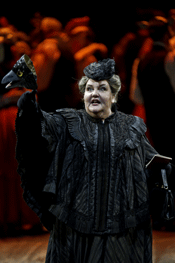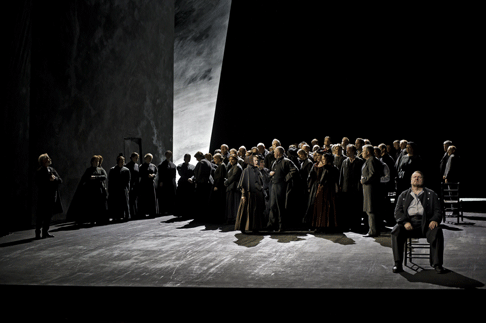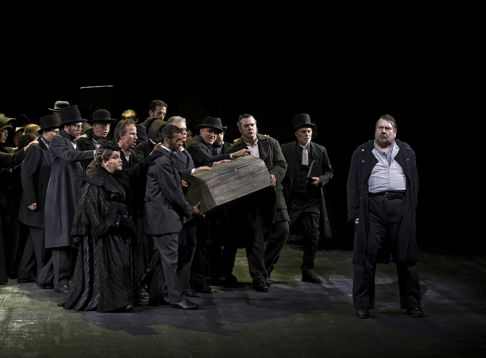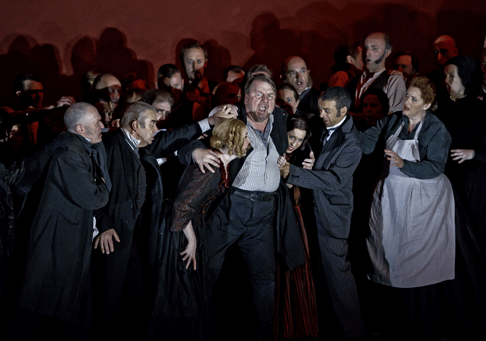![Ben Heppner as Peter Grimes [Photo by Clive Barda courtesy of The Royal Opera]](http://www.operatoday.com/PETER-GRIMES.110615_0158.gif)
23 Jun 2011
Peter Grimes, Covent Garden
Willy Decker’s production of Peter Grimes, first seen at Covent Garden in 2004, should perhaps be renamed The Borough.
English Touring Opera are delighted to announce a season of lyric monodramas to tour nationally from October to December. The season features music for solo singer and piano by Argento, Britten, Tippett and Shostakovich with a bold and inventive approach to making opera during social distancing.
This tenth of ten Live from London concerts was in fact a recorded live performance from California. It was no less enjoyable for that, and it was also uplifting to learn that this wasn’t in fact the ‘last’ LfL event that we will be able to enjoy, courtesy of VOCES8 and their fellow vocal ensembles (more below …).
Ever since Wigmore Hall announced their superb series of autumn concerts, all streamed live and available free of charge, I’d been looking forward to this song recital by Ian Bostridge and Imogen Cooper.
Although Stile Antico’s programme article for their Live from London recital introduced their selection from the many treasures of the English Renaissance in the context of the theological debates and upheavals of the Tudor and Elizabethan years, their performance was more evocative of private chamber music than of public liturgy.
Evidently, face masks don’t stifle appreciative “Bravo!”s. And, reducing audience numbers doesn’t lower the volume of such acclamations. For, the audience at Wigmore Hall gave soprano Elizabeth Llewellyn and pianist Simon Lepper a greatly deserved warm reception and hearty response following this lunchtime recital of late-Romantic song.
For this week’s Live from London vocal recital we moved from the home of VOCES8, St Anne and St Agnes in the City of London, to Kings Place, where The Sixteen - who have been associate artists at the venue for some time - presented a programme of music and words bound together by the theme of ‘reflection’.
'Such is your divine Disposation that both you excellently understand, and royally entertaine the Exercise of Musicke.’
‘And there was war in heaven: Michael and his angels fought against the dragon; and the dragon fought and his angels, And prevailed not; neither was their place found any more in heaven … that old serpent … Satan, which deceiveth the whole world: he was cast out into the earth, and his angels were cast out with him.’
There was never any doubt that the fifth of the twelve Met Stars Live in Concert broadcasts was going to be a palpably intense and vivid event, as well as a musically stunning and theatrically enervating experience.
‘Love’ was the theme for this Live from London performance by Apollo5. Given the complexity and diversity of that human emotion, and Apollo5’s reputation for versatility and diverse repertoire, ranging from Renaissance choral music to jazz, from contemporary classical works to popular song, it was no surprise that their programme spanned 500 years and several musical styles.
The Academy of St Martin in the Fields have titled their autumn series of eight concerts - which are taking place at 5pm and 7.30pm on two Saturdays each month at their home venue in Trafalgar Square, and being filmed for streaming the following Thursday - ‘re:connect’.
The London Symphony Orchestra opened their Autumn 2020 season with a homage to Oliver Knussen, who died at the age of 66 in July 2018. The programme traced a national musical lineage through the twentieth century, from Britten to Knussen, on to Mark-Anthony Turnage, and entwining the LSO and Rattle too.
With the Live from London digital vocal festival entering the second half of the series, the festival’s host, VOCES8, returned to their home at St Annes and St Agnes in the City of London to present a sequence of ‘Choral Dances’ - vocal music inspired by dance, embracing diverse genres from the Renaissance madrigal to swing jazz.
Just a few unison string wriggles from the opening of Mozart’s overture to Le nozze di Figaro are enough to make any opera-lover perch on the edge of their seat, in excited anticipation of the drama in music to come, so there could be no other curtain-raiser for this Gala Concert at the Royal Opera House, the latest instalment from ‘their House’ to ‘our houses’.
"Before the ending of the day, creator of all things, we pray that, with your accustomed mercy, you may watch over us."
The doors at The Metropolitan Opera will not open to live audiences until 2021 at the earliest, and the likelihood of normal operatic life resuming in cities around the world looks but a distant dream at present. But, while we may not be invited from our homes into the opera house for some time yet, with its free daily screenings of past productions and its pay-per-view Met Stars Live in Concert series, the Met continues to bring opera into our homes.
Music-making at this year’s Grange Festival Opera may have fallen silent in June and July, but the country house and extensive grounds of The Grange provided an ideal setting for a weekend of twelve specially conceived ‘promenade’ performances encompassing music and dance.
There’s a “slide of harmony” and “all the bones leave your body at that moment and you collapse to the floor, it’s so extraordinary.”
“Music for a while, shall all your cares beguile.”
The hum of bees rising from myriad scented blooms; gentle strains of birdsong; the cheerful chatter of picnickers beside a still lake; decorous thwacks of leather on willow; song and music floating through the warm evening air.
![Ben Heppner as Peter Grimes [Photo by Clive Barda courtesy of The Royal Opera]](http://www.operatoday.com/PETER-GRIMES.110615_0158.gif)
Willy Decker’s production of Peter Grimes, first seen at Covent Garden in 2004, should perhaps be renamed The Borough.
For in this reading, it is Britten’s powerful choruses which really excite and dominate: a frightening embodiment of Victorian moral hypocrisy and viciousness, the grey-costumed mob ebb and flow, an amorphous mass exerting an oppressive and irresistible moral force.
There’s nothing inherently wrong with this reading, for Britten’s opera contains astonishingly virtuosic ensembles which erupt in Verdian climaxes. Think of the intricate polyrhythms of the shanty, ‘Old Joe has gone fishing’, where the lop-sided 7/4 tempo aptly conveys the community’s struggle both to resist the storm raging outside the tavern and to quell the disturbances caused by Grimes’ presence within. However, something of the rich diversity of the community, and thus of the opera’s colour palette, is lost. At times, the stage seems over-populated and the incessant movement can be messy and distracting; and, it’s hard for the colourful cast of minor roles to emerge with clarity from the crowd. Even in the Prologue, when Grimes is called to account for the apprentice’s death, Matthew Best’s Swallow struggled to contain the baying throng and to assert his authority despite his well-focused voice and confident stage manner.
 Jane Henschel as Mrs Sedley
Jane Henschel as Mrs Sedley
Some of the cast did manage to rise above the multitudes. Roderick Williams was an engaging Ned Keene, his warm tone and lyricism often suggesting a less antagonistic attitude towards Grimes – a much needed counterpoint to the pack’s pitiless cruelty. Martyn Hill’s Rector came effectively to the fore without strain, while Balstrode’s sincerity and authority was well captured by Jonathan Summers. Although Decker’s Mrs Sedley lapses into caricature, Jane Henschel cleverly suggested the latent power she exerts; seated stony-faced at the front of the stage, impervious to the taunts and ridicule of the drinkers in the tavern scene, she later becomes the driving force behind the persecution, leading the community in the unquestioning conformity. Moreover, in an unusually striking presentation of these minor female roles, Auntie (Catherine Wyn-Rodgers) and her two Nieces (Rebecca Bottone and Anna Devin) provided a welcome splash of visual and vocal colour in the tavern scene.
Amanda Roocroft tried hard to inject some warmth and tenderness into what is a rather severe interpretation of Ellen Orford, the village school mistress who yearns to save Grimes from the Borough’s tyranny and from his own inner demons. In a typically strong characterisation, Roocroft was imposing in the face of the community’s onslaught and criticism, using lyricism to oppose their callousness. However, dramatic strength was sometimes achieved at the expense of clear diction and musical accuracy, and an overly wide vibrato at times resulted in a slightly unfocused tone.
 Prologue, Ben Heppner as Peter Grimes
Prologue, Ben Heppner as Peter Grimes
But, the real problem with this production is that the fate of its protagonist is never in doubt. There is not ‘conflict’ so much, between the outsider and the community, as total alienation. Estranged and unapproachable from the start, distressingly obsessed with the child’s coffin when Ellen tries to call him away, this Grimes is totally isolated and impossible to ‘save’: in Act 3 he simply covers his head (mimicking his apprentice’s earlier gesture of fear) when Ellen and Balstrode attempt to reach out to him. However, the libretto avows his intent to earn enough money to marry Ellen – he wants to win her respect and not just her pity – and to win acceptance by the community: and, it is hard to believe in this declaration or to understand why anyone would want acceptance from this community.
Ben Heppner certainly conveyed Peter Grimes’ existential despair. He is clearly a victim, and his obvious guilt and remorse should earn our forgiveness. Yet even during his visionary soliloquies and angry counter-attacks, Heppner struggled to retain his place at the centre of the audience’s vision. Moreover, there were major vocal concerns. His duet with Ellen in the Prologue was marred by poor tuning and frequently, as in ‘What harbour shelters peace?’ where the soaring minor ninths recall the tentative optimism and yearning of the Prologue duet, the voice sounded gravelly and strained. Short fragmented phrases and a rough-hewn quality created a sense of breathlessness and unease, but there was no sense of Grimes’ inner lyricism.
 (Left to Right) Jane Henschel as Mrs Sedley, Roderick Williams as Ned Keene, Matthew Best as Swallow, Alan Oke as Bob Boles, Stephen Richardson as Hobson, Martyn Hill as Rector, Ben Heppner as Peter Grimes
(Left to Right) Jane Henschel as Mrs Sedley, Roderick Williams as Ned Keene, Matthew Best as Swallow, Alan Oke as Bob Boles, Stephen Richardson as Hobson, Martyn Hill as Rector, Ben Heppner as Peter Grimes
So many of Grimes’ numbers, originally designed to suit and enhance the vocal characteristics of Peter Pears, are mercilessly exposed; and in ‘The Great Bear’ Heppner could not control the floating head voice required. The descending scales, which convey the futility of Grimes’ hopes that he will turn the skies back and ‘begin again’, were woefully flat. Since so much of the drama is conveyed through harmonic conflicts and relationships, this was both musically dissatisfying and disrupted the dramatic arguments of the work.
These five performances at Covent Garden are dedicated to three recently deceased tenors, each of whom has stamped their own identity on a role defined for so long by Pears: Philip Langridge, Anthony Rolfe-Johnson and Robert Tear. Neither Decker nor Heppner present us with a Grimes to challenge these forebears. Decker’s Grimes does not even look like a fisherman! More importantly, in this opera so much depends on ambiguity (‘perhaps you’re not to blame that the boy died’, says Balstrode): we look in horror but we understand, we shudder but forgive, and this delicate balance between opposing forces – dramatic and musical – needs to be sustained. Decker’s vision is powerful in its clarity but loses the dramatic tension that such ambiguity bestows.
Finally, it is a vigorously anti-religious production, a reading that is perfectly justified by the text and complements the Victorian updating. But, of Britten’s desire “to express my awareness of the perpetual struggle of men and women whose livelihood depends on the sea”, there is little acknowledgement – apart from some Turner-esque backdrops. As the curtain rises in Act 1, the orchestra paints a picture of the dawn labours of a community dependent on the sea: ripples in the clarinet depict the glitter of the rising sun on the tossing waves; a high, ornamented melody recreates the dips and dives of a soaring gull; surges in the brass announce the ocean’s threatening undercurrents. The chorus sing of the duties which draw the fishing families together in hardship, perseverance and solidarity. Decker presents us with a church congregation, literally singing from the same hymn sheet – but the rhythms are those to accompany the hauling of nets and the tugging of sails. Although this dramatic motif returns in a powerful gesture in the closing moments of the opera – as, defeated, Ellen reluctantly takes her place among the worshippers, covering her face with the hymn sheet, to erase her identity and resistance – it sits awkwardly with the musical drama.
 (Left to Right) Alan Oke as Bob Boles, Jonathan Summers as Balstrode, Anna Devin as Second Neice, Ben Heppner as Peter Grimes, Rebecca Bottone as First Neice, Roderick Williams as Ned Keene, Catherine Wyn-Rogers as Auntie
(Left to Right) Alan Oke as Bob Boles, Jonathan Summers as Balstrode, Anna Devin as Second Neice, Ben Heppner as Peter Grimes, Rebecca Bottone as First Neice, Roderick Williams as Ned Keene, Catherine Wyn-Rogers as Auntie
John Macfarlane’s set is visually impressive; steeply raked walls and a tilted stage increasing the sense of claustrophobia and repressed chaos. And, conductor Andrew Davis certainly drives the pace incessantly forward with a real sense of urgency and passion, even if he does not always achieve the required fullness of texture and depth of resonance. But ultimately there are too many compromises, and the cast, especially Heppner, are not quite strong enough to make Decker’s vision convincing.
Claire Seymour